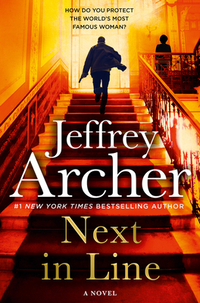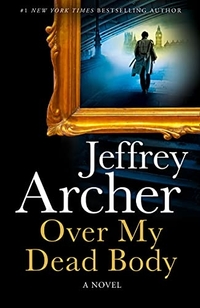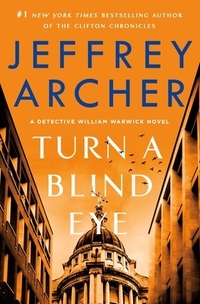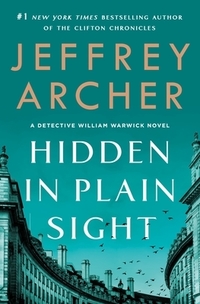Traitors Gate by Jeffrey Archer
 Friday, September 22, 2023 at 10:14AM
Friday, September 22, 2023 at 10:14AM 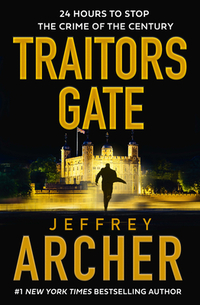
Published by HarperCollins on September 26, 2023
For several novels (this one is number six), Jeffrey Archer has been following the stellar career of William Warwick as he has worked his way up the chain of command in London law enforcement. Warwick is a model of rectitude, a perfect officer who has a perfect marriage to a perfect wife and the smartest and most perfectly behaved children in all of England and thus the world. The ideal kids love learning British history because what could be more fascinating than knowing the year that William the Conqueror died? To be fair, British royalty is even more fascinating to every character in the novel. American readers might need to stifle a yawn at the various history lectures and Inside Royalty discussions that fill the pages while the plot pauses for a nap.
William becomes Chief Superintendent early in this novel, continuing his meteoric career ascension. He receives the news of his promotion while orchestrating the transportation of the crown jewels from the Tower of London to Parliament, where the Queen is about to give a boring speech. Readers who love the esoterica of British royal customs (I don’t know how many Americans are in that group) might enjoy all the gushing prose about Her Majesty’s performance of her royal duties. The fascination with the Queen is compounded by drooling descriptions of the red robes with white ermine worn by Lords, the Queen’s carriage, and all the other frivolity that accompanies British pomp and circumstance. Readers who have no interest in such pageantry can skip several sections of the novel. (Many will want to skip past the conversation that extolls the virtues of Margaret Thatcher. Tony Blair takes office during the novel, but characters keep their opinions about Blair to themselves.)
As always, William turns to Detective Inspector Ross Hogan when he needs something shady done and doesn’t want to sully his reputation. As always, the story features courtroom scenes involving William’s father, a barrister with a rigid stick up him bum who usually prosecutes for the Crown but occasionally represents defendants on the condition that they are actually innocent. As always, Booth Watson is an unethical barrister who opposes William’s father while serving the interest of greed. As always, Watson’s greediest client is Miles Faulkner who, as always, is assisted in his efforts at grifting his by ex-wife Christina, unless he happens to be grifting Christina as he does in this novel, as always. At this point, an AI could probably write these novels, perhaps more creatively than Archer.
Courtroom theatrics are generally the best elements in the Warwick novels, although Archer muddles some of the details. In one trial, Williams’ father elicits testimony from Hogan that methamphetamine is more commonly known as ecstasy, when in fact they are entirely different drugs. One might think that a cop would know that, even if the elder Warwick is too busy hobnobbing with members of the upper class to be bothered with knowledge of the cases he prosecutes. In a different case, the narrative three times refers to a witness as the client of Watson when Watson is prosecuting. As a prosecutor, his client is the Crown, not the witness. These are the kinds of errors an editor should have noticed. Still, the central courtroom scene has the kind of Perry Mason gotcha questions that enliven courtroom dramas.
Watson starts off the novel by trying to pull a con on a widow, offering to underpay for her gallery before reselling it at a hefty profit to Miles. William’s wife Beth intervenes to save the widow. Beth is an art dealer but has been invited to apply as the director of a prestigious art museum where she once worked. Beth’s business partner Christina is yet again looking to undercut Beth, making her the worst friend in history and raising questions about Beth’s inability to see what a wretch she’s chosen for a BFF.
Miles keeps getting released (or escaping) from prison so that William can lock him up again. His grand scheme in this novel — well, I mentioned the crown jewels, so you can guess his criminal goal. Another subplot involves Miles’ switch of a real Rubens for a forgery that was donated to the museum where Beth is about to be reemployed. Naturally William wants to switch it back, notwithstanding that the original is now in Miles’ Manhattan apartment. This segment of the novel feels like a space filler, given the recurring theme of Miles and Christina exchanging forged paintings for real ones throughout the series.
The crown jewels caper is less a theft (because what pawn shop will pay a fair price for the crown jewels?) and more an opportunity to embarrass William. There is little suspense as William finds ways to thwart Miles’ various criminal schemes, but the crown jewels plot is at least more original than the switched paintings. In another moderately interesting subplot, Miles tries to set up Hogan for attempting to influence a juror in the drug case by shagging her during the trial. William is certain that Hogan would shag the woman if given the opportunity but is confident that Hogan would wait until after the verdict. It’s good to have friends who understand your virtues and weaknesses.
I suppose there is a final book in this series upcoming, as William has not yet been given the top job. Miles will presumably be released from prison to torment William yet again. I’m recommending this book because readers who haven’t read the other books in the series might not be bored by this one, but I hope Archer soon finds less tedious characters to write about.
RECOMMENDED
